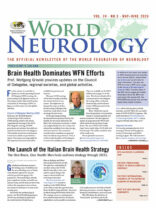Global Advocacy Training in the Spotlight
We’d like to welcome all readers to the June 2024 issue of World Neurology. This issue includes a call for applications for the upcoming Global Advocacy Leadership Program, co-led by the American Academy of Neurology (AAN) and the World Federation of Neurology (WFN). Recognizing the important role of advocacy for improvement in neurologic care, access, outcomes, and the field of neurology worldwide, this is an innovative and exciting program for advocacy training for neurologists from low- and lower-middle-income countries. Please visit the AAN website for more information about the program and the application process! The application deadline is Aug. 14, 2024.
Continuing with the advocacy theme, Drs. Christina Briscoe Abath and Keryma Acevedo discuss the importance of collaborating for awareness, management, and education about infantile epileptic spasms syndrome, an epileptic syndrome where early diagnosis and management is critical for optimal developmental outcomes. Also in this issue, Drs. Matilde Leonardi and Alessandro Padovani report on the launch of the Italian Brain Health Strategy (2024-2031) and its One Brain, One Health Manifesto.
In the President’s Column, WFN President Wolfgang Grisold provides updates on many WFN activities, including World Brain Day (WBD) 2024, the introduction of the WHO Intersectoral Global Action Plan (IGAP) Toolkit, the upcoming World Federation of Neurology Digital Neurology Updates (WNU) 2024 (an important educational initiative planned for September 2024), as well as many other ongoing initiatives.
Drs. Morris Freedman, Surat Tanprawate, Steven Lewis, and Wolfgang Grisold, as well as Chiu Keung Man, report on the exciting launch of the WFN eLearning hub, a novel e-Learning platform that offers free access to a broad spectrum of high-level educational material in neurology for neurologists and other health care professionals across the world.
In the History Column, coinciding with the 100th anniversary of the first human EEG recording, Dr. Peter Koehler provides an extensive and well-illustrated report on the origins and development of EEG recording and leading into its current and evolving role in brain-computer interfaces.
This issue also includes reports from recent national and regional congresses. Drs. Rajeev Ojha and Marianne de Visser report on the First International Congress of the Nepalese Academy of Neurology, and Dr. Aida Kondybayeva reports on the VI International Educational Forum, the Neurology Update in Kazakhstan, which took place in Almaty, Kazakhstan.
Dr. Tissa Wijeratne also reports on the session held at the recent 65th Japanese Society of Neurology and 19th Asian Congress of Neurology (AOCN2024), where a joint WFN-AOAN session focused on the WHO IGAP and its implications and call for action in the Asian Oceanian regions. This issue also includes a photo of Dr. Vladimir Hachinski, a previous WFN president, receiving the prestigious Ryman Prize from the president of New Zealand.
Finally, this issue includes the statements from each of the six candidates brought forward by the WFN Nominations Committee for the position of WFN elected trustee, in preparation for voting prior to the upcoming Council of Delegates meeting.
In closing, thank you for your continuing interest in the WFN and World Neurology, and we look forward to sharing more details about the many activities for neurologists worldwide in upcoming issues. We encourage all of you to participate in (and initiate) many activities surrounding World Brain Day 2024 devoted to Brain Health and Prevention. We also remind our readers from low- and lower-middle-income countries to consider applying for the AAN/WFN Global Advocacy Leadership Program. •
